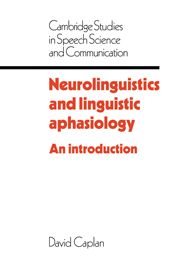Book contents
- Frontmatter
- Contents
- Preface
- Part I Introduction
- Part II Clinical aphasiology and neurolinguistics
- 3 The discoveries of Paul Broca: localization of the “faculty for articulate language”
- 4 Classical connectionist models
- 5 Extensions of connectionism
- 6 Objections to connectionism
- 7 Hierarchical models
- 8 Global models
- 9 Process models
- 10 Overview of clinical aphasiology and neurolinguistics
- Part III Linguistic aphasiology
- Part IV Contemporary neurolinguistics
- References
- Author index
- Subject index
3 - The discoveries of Paul Broca: localization of the “faculty for articulate language”
Published online by Cambridge University Press: 10 December 2009
- Frontmatter
- Contents
- Preface
- Part I Introduction
- Part II Clinical aphasiology and neurolinguistics
- 3 The discoveries of Paul Broca: localization of the “faculty for articulate language”
- 4 Classical connectionist models
- 5 Extensions of connectionism
- 6 Objections to connectionism
- 7 Hierarchical models
- 8 Global models
- 9 Process models
- 10 Overview of clinical aphasiology and neurolinguistics
- Part III Linguistic aphasiology
- Part IV Contemporary neurolinguistics
- References
- Author index
- Subject index
Summary
The first scientific studies of patients with acquired disorders of language were presented in the last half of the nineteenth century. They began with an address by Paul Broca before the Anthropological Society of Paris in 1861. That presentation and Broca's work over the next four years established an approach to aphasia and neurolinguistics which has dominated the field until recent years. We therefore begin with this seminal body of work.
Broca's 1861 presentation took place during an ongoing debate about the phrenological theory of the localization of higher functions in the brain. The phrenologists – Gall, Spurzheim, and others – had claimed that the moral, intellectual, and spiritual faculties of man were each the result of the activity of particular portions of the brain, and that the size of the brain area responsible for a given ability determined the degree of development of that ability or faculty in an individual. The phrenologists also argued that the size of portions of the skull reflected the size of the underlying brain, and that they could predict the capacities of individuals by palpating their heads. This they did, in popular and remunerative demonstrations. The scientific community of the mid-nineteenth century had mixed feelings about the phrenological doctrine, and its fairly notorious and lucrative popularization and application, and by 1861 most of its claims had been refuted.
The claim which remained somewhat intact was that language was located in the frontal lobes of the brain, in particular in the portion just above the eye socket (the supra-orbital portion). Bouillaud, an influential French physician, had published papers in 1830 and 1848 arguing in favor of this localization.
- Type
- Chapter
- Information
- Neurolinguistics and Linguistic AphasiologyAn Introduction, pp. 43 - 48Publisher: Cambridge University PressPrint publication year: 1987



